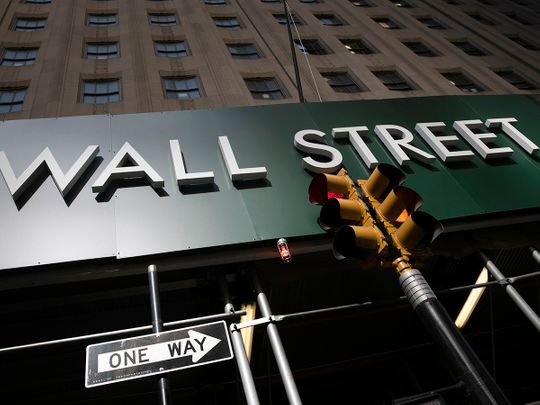
New York: After breathing a sigh of relief when the Federal Reserve held off on signaling more aggressive measures ahead to fight inflation, Wall Street tumbled on Thursday amid renewed anxiety over rising interest rates, while the pound slumped on fears of a UK recession.
The sell-off was New York’s worst since 2020, and saw the Nasdaq — dominated by tech firms that are particularly sensitive to higher rates — lose five per cent, while the Dow and S&P 500 fell more than three per cent. With US inflation at levels not seen since the 1980s, the Fed on Wednesday hiked the key lending rates by half a per centage point, but cheered markets, at least at first, by saying a three-quarter point increase was not in the cards.
That message was not as hawkish as feared, but the Fed still is engaged in “one of the most aggressive tightening cycles that we have seen in decades,” said Angelo Kourkafas, investment strategist at Edward Jones. “It didn’t necessarily change the narrative that economic growth is slowing, while the Fed will tighten monetary policy” at a fast pace.
Pound slips
In Britain, the pound suffered after the Bank of England released an updated forecast, predicting annual inflation would rise above 10 per cent and the economy would contract later this year, while hiking its main rate by an as-expected quarter-point.
The pound plunged more than two per cent due to “the changes in the economic forecasts, which pointed to a potential recession by year end, and the warnings that rates may not rise as high as markets had been expecting in the months ahead,” said market analyst Michael Hewson at CMC Markets UK.
The BoE said UK output was expected to contract in the final quarter of the year when inflation is likely to enter double digits as household energy prices rise sharply, although the central bank does not forecast a full-blown recession for the moment. “Uncertainty over inflation and growth puts rate setters in a tricky dilemma,” City Index analyst Fawad Razaqzada said.
“The key risk facing the UK is not necessarily tighter policy, but uncertainty over monetary policy and, more to the point, stagflation.”
Central banks worldwide are raising interest rates to fight inflation that is sitting at the highest levels in decades as economies ease pandemic restrictions while dealing with the war in Ukraine, which increased already high energy costs. News that Turkish inflation soared to 70 per cent in April highlighted the battle policymakers face in controlling prices.
In European trading, London managed to hold onto a marginal gain but both Frankfurt and Paris fell.












